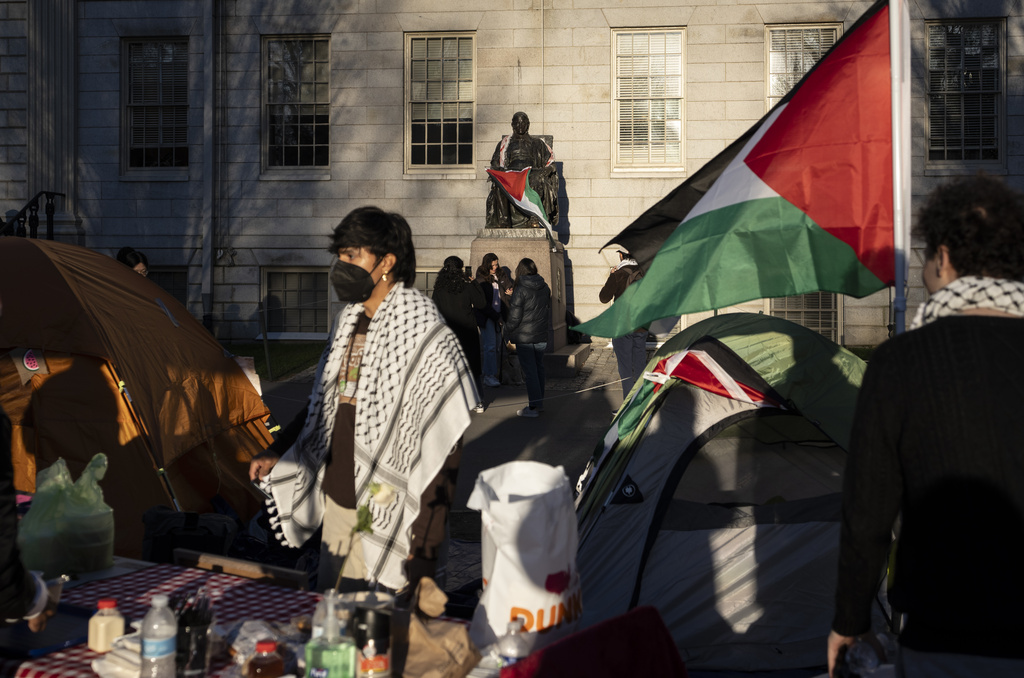For more than half a century, the Ivy League was filled with Jewish students. Jewish enrollment surged in the 1960s after decades of discriminatory quotas, and by the 1980s and 1990s, Jewish students were often overrepresented by a factor of ten compared to their share of the U.S. population. Harvard Hillel bustled, Columbia was a magnet for elite day school graduates, and Penn could boast of a Jewish student body that rivaled small universities on its own.
But since Hamas’s October 7 massacre and Israel’s ensuing war in Gaza, America’s most prestigious universities have become the stage for sprawling pro-Palestinian protests, bitter campus politics, and an alarming surge in antisemitic incidents. And the fallout is being measured not just in lawsuits, headlines, or congressional hearings — but also in enrollment numbers.
According to new data from Hillel International, the share of Jewish students at Harvard, Columbia, Cornell and the University of Pennsylvania has dropped between 3 and 5 percentage points since 2023 — nearly 100 fewer Jewish students per incoming class. On paper, those declines might look modest. In practice, they mark one of the sharpest retreats of Jewish presence in the Ivy League since the end of the quota era.
At Penn, the trend tells the story. Jewish enrollment was about 20 percent in 2010. By 2016, it had fallen to 13 percent. Now, after years of campus tension and a bruising year of anti-Israel activism, the slide is accelerating at the very institutions that once counted Ronald Lauder, Steven Spielberg, and Michael Bloomberg among their Jewish alumni.
This is not just about teenagers making different choices. Hillel says it’s their parents who are steering them elsewhere. In a recent survey of Jewish parents, nearly two-thirds admitted crossing at least one elite university off the application list out of fear of antisemitism.
The change is already reshaping pipelines at elite Jewish prep schools. At Ramaz, the storied Manhattan day school whose graduates routinely flood Columbia’s freshman class, not a single senior enrolled there last year. In the school’s history, that had never happened before.
The numbers revive a dark history. Harvard President Lawrence Lowell once defended quotas by claiming “antisemitism increases in proportion to the number of Jews.” For decades, those unwritten caps defined Jewish life at the Ivies. By the late 20th century, the barriers had collapsed and Jewish students poured in, helping to set the cultural, academic, and political tempo of campus life.
Now, nearly a century later, Jewish students are again absenting themselves from the Ivies — this time voluntarily, driven not by exclusion but by fear.
At Harvard, an Israeli-American student was attacked in the wake of October 7. At Columbia, Jewish undergraduates filed federal lawsuits after weeks of harassment. Surveys show self-censorship spiking: in 2023, just 13 percent of Jewish Ivy Leaguers said they held back out of fear; in 2024, that number had shot up to 35 percent.
The vacuum is being filled — just not in the Northeast. The South and Southwest are aggressively courting Jewish students, rolling out kosher dining halls, new Hillel buildings, and cultural centers. Vanderbilt in Nashville has seen its Jewish population grow by 20 percent in two years. Tulane in New Orleans now counts 40 percent of its undergraduates as Jewish. The University of Florida boasts the largest Jewish student body in the nation — roughly 10,000 — and Jewish event attendance has jumped 50 percent since 2021. Even Clemson in South Carolina, once barely on the radar, has seen participation quadruple.
“It’s not that they’re specifically looking for a pro-Israel place,” said Rabbi Zalman Lipsker, head of Chabad at Emory University in Atlanta. “They just want to study without fear of harassment or violence on their way to class.”
(YWN World Headquarters – NYC)












4 Responses
Are these estimates based on all students with Jewish ancestry, or only ones that are Shomer Kashrus? The article cites evidence based on the non-assimilated Jews identified by Jewish organizations, but the vast majority of “Jews” on college campuses are in fact largely assimilated. If assimilated Jews are still flocking to the elite universities in “blue” states, then there has been no significant change affecting the overall Jewish community. The frum (Shomer Shabbos) community, on the other hand, can be expected to considering moving towards jurisdictions that are less hostile.
Boruch Hashem that these yidden are no longer going to these goyish colleges!!! It seems the anti-semtisim did the job its supposed to do – remind us that we are yidden and dont belong mixed in at theyr colleges, hopefully they wont just go to the other goyish colleges tho
Here comes akuperma with their farrakhan era conspiracies about “real jews”.
As for the Ivies. This is great news. Islamists from overseas pay full price. Jews, real or “fake” are probably on scholarships.
has Touro seen an increase? YU is not mainstream for the frum